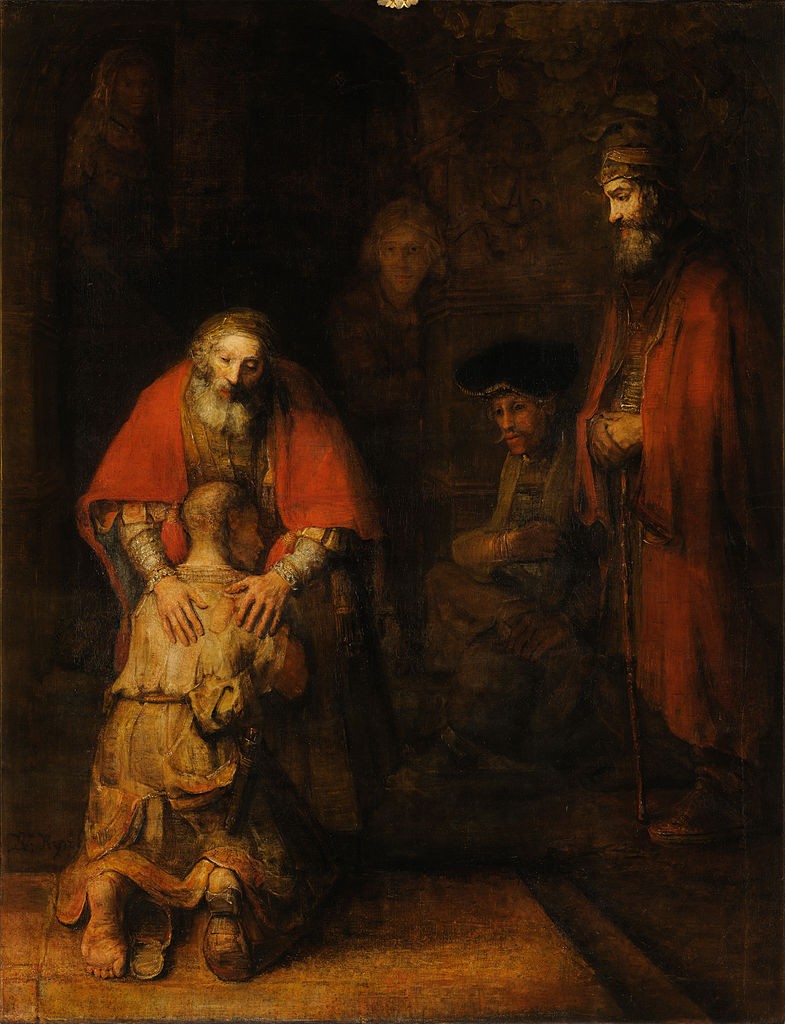Today’s first reading from the Book of Joshua finds the Israelites at the end of their 40 year journey through the desert. They have arrived on the planes of Jericho to their Promised Land. No longer feeding on manna, but upon the rich produce of this fertile land, each of which are provided them by the Providence of God.
In today’s Second reading from Paul’s Second Letter to the Corinthians, we hear about another promise of God reaching its fulfilment; this promise is the new and eternal covenant in the person of Jesus Christ. Through God the Creator, all things come to life. Therefore St. Paul can say: “Whoever is in Christ is a new creation.” Through Jesus Christ, all things are renewed, redeemed. Thus St. Paul today encourages us to be reconciled to God through Jesus Christ. Through Jesus Christ, God reconciles the world to himself, not counting our trespasses against us.
 Jesus himself speaks to us today with perhaps one of his most powerful and instructive parables. In this story of the prodigal son, we learn of the incredible, patient love of the Father, and the great joy he experiences in forgiving our sins. In fact, Luke begins this account by recalling the words of the Pharisees and scribes as they are concerned that Jesus “welcomes sinners and eats with them.” Indeed, we are all sinners. And here, today, Jesus welcomes us once again. Here, today, Jesus sits down to a meal with us. Indeed, Jesus feeds us with his own body and blood, and nourishes us with his life-giving Word. We have only to use the eyes of faith to “Taste and see the goodness of the Lord.” (Psalm 34)
Jesus himself speaks to us today with perhaps one of his most powerful and instructive parables. In this story of the prodigal son, we learn of the incredible, patient love of the Father, and the great joy he experiences in forgiving our sins. In fact, Luke begins this account by recalling the words of the Pharisees and scribes as they are concerned that Jesus “welcomes sinners and eats with them.” Indeed, we are all sinners. And here, today, Jesus welcomes us once again. Here, today, Jesus sits down to a meal with us. Indeed, Jesus feeds us with his own body and blood, and nourishes us with his life-giving Word. We have only to use the eyes of faith to “Taste and see the goodness of the Lord.” (Psalm 34)
Because we are all sinners, we see ourselves in the son who demands of the Father: “Father, give me the share of your estate that should come to me.” We are at times incapable of recognizing the goodness of the Lord; ungrateful, we demand what is freely given for selfish possession and consumption. In the process of displacing the Father from our life, we find ourselves in ‘a distant country’ far from the Father’s love. Mind you, the Father never stops loving us; we through our sinful and selfish choices cut ourselves off from that love. Our journey through this life often resembles the Israelites who for 40 years journeyed in the desert because of their hardness of heart. God remained with them all that time, and yet they were far from the Promised Land, in their hearts, they were far from God.
Because we are sinners, we also see ourselves in the older son, who is angry that the Father overlooks the selfishness and sinfulness of the younger son, re-instating him to full stature in the family. He is incapable of such compassion and forgiveness. The older son also fails in his own way to see the love the Father has for him that he always shares in everything the Father has. In his anger and short-sightedness, the older son also separates himself from the Father and the family. He, too, needs to be reconciled in and by the Father’s love.
Finally, we are called to see ourselves in the Father. Once we have been reconciled to God through Jesus Christ, we are to exercise the same patient love as the Father in our relationships with one another. In this Year of Mercy, let us exercise such compassion, being ‘ambassadors for Christ, so that ‘we might become the righteousness of God in him.’ (2 Corinthians 5:21)
0